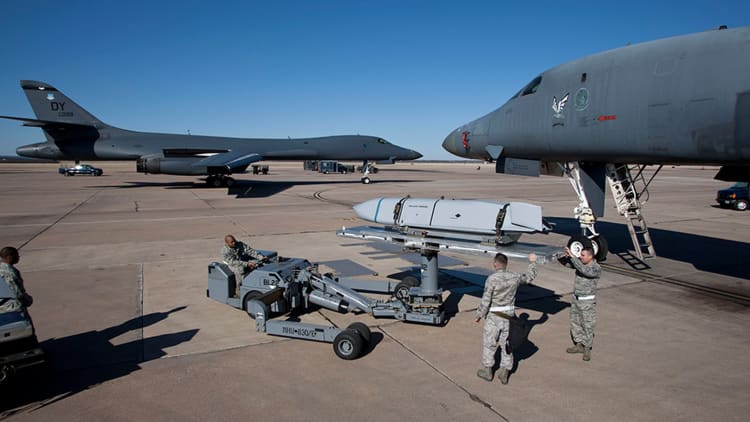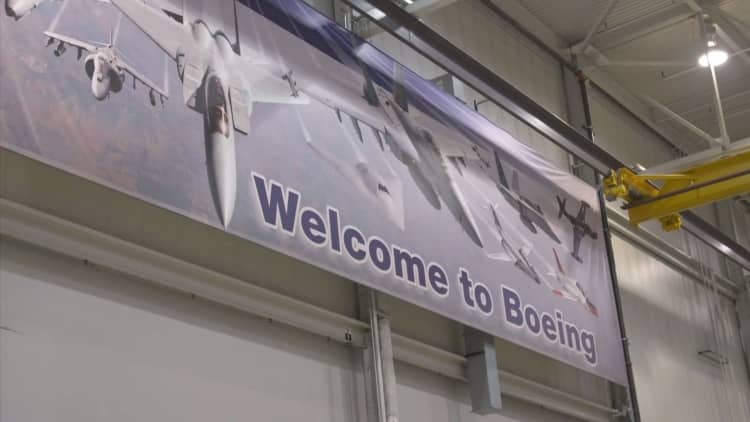
The trade dispute between Boeing and Canadian rival Bombardier is heating up — and Boeing intends to stand its ground.
"This commercial trade dispute is very important to us. We're not going to back down from it," said Leanne Caret, CEO of Boeing's defense, space and security business, in an exclusive interview with CNBC. "I hope that it doesn't impact our defense sale, but we're willing to deal with whatever the outcome is."
That potential defense sale is worth about $5 billion. Last week the U.S. State Department notified Congress of its intent to sell 18 F/A-18 Super Hornets to Canada, in a deal that's been cooking since last year.
But the trade rift between Boeing and Canada's own aerospace manufacturer may put that on hold. Earlier this week, Canada Prime Minister Justin Trudeau asserted his country "won't do business with a company that's busy trying to sue us and put our aerospace workers out of business."
U.K. Prime Minister Theresa May also engaged in the dispute, siding with Bombardier, which is a top employer in Northern Ireland.
In April, Boeing asked the U.S. Commerce Department to investigate whether Bombardier had taken advantage of alleged subsidies and unfair pricing to sell 75 of its new C-Series planes to Delta Air Lines. Boeing claims that its Canadian rival sold planes, at $19.6 million apiece, in the U.S. at "absurdly low prices, in violation of U.S. and global trade laws."
Bombardier refutes the allegations as "pure hypocrisy" since, according to a statement, "Delta ordered the C Series because Boeing stopped making an aircraft of the size Delta needed years ago."
Boeing still aims to get a deal done.
"We have continued to reach out to the Canadian government. We believe national defense discussions are separate from commercial trade disputes," added Caret, who's led Boeing's defense, space and security unit for 18 months. "I think here is an opportunity for us to continue to offer the [Super Hornet] aircraft, but I also think they're going to need to make their decision."
More will be revealed next week, when the U.S. Commerce Department issues its initial ruling on Sept. 26.
Meantime, it highlights a big reversal for Boeing: that the fighter business is once again taking flight. Even if Canada does scrap its $5 billion deal, the company's legacy F-18 and F-15 production lines are welcoming renewed interest under the Trump administration.
"We're honored and thrilled that not only the Navy but others have seen benefits of the F/A-18 and continue to see strong demand for it. We have continued international pull on our F-15s," said Caret. "But I have to share, when I was the CFO [of Boeing Defense, Space & Security] I was in middle of making disclosures that we may be looking at a line shutdown at some point in the future, so it was really nice to be involved in being able to strike that statement going forward."
With nearly $30 billion in annual revenue, the defense and space business is big. But the commercial business is bigger, meaning the company would be willing to sacrifice a potential $5 billion defense deal because more is potentially riding on the lawsuit.
Overall, it's been a busy week for Boeing. The aerospace giant hosted investors in Charleston, S.C. for two days. And amid renewed issues, the company's initial delivery of the already over-cost KC46 Pegasus military refueling tanker (a $44 billion program) is now highly likely to slide back into 2018.
And just today, Caret specifically was named to the Fortune Magazine's Most Powerful Women list.
In her first-ever broadcast interview as CEO, Caret also discussed with CNBC missile defense, M&A and space exploration.
WATCH: Boeing's spat with Bombardier gets political



